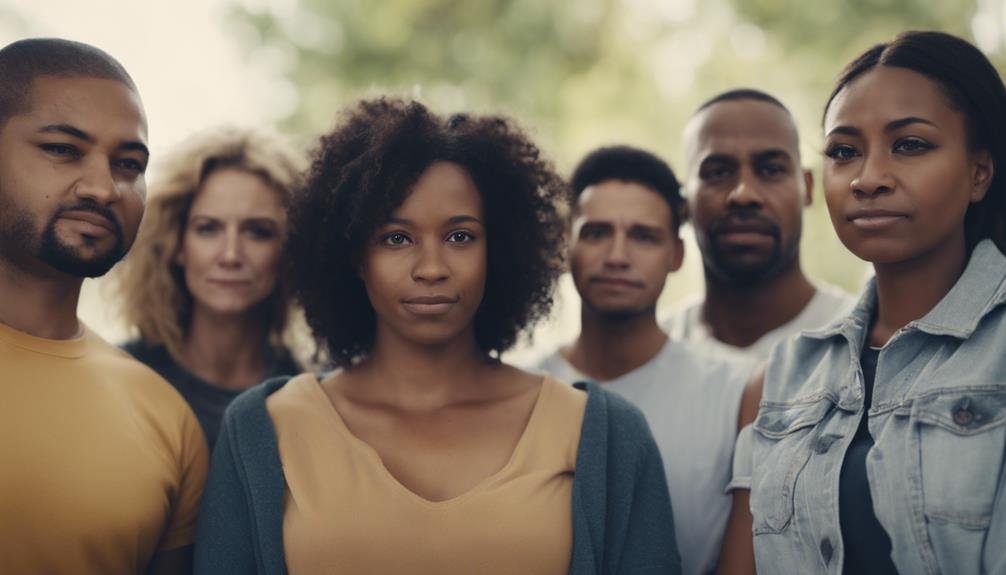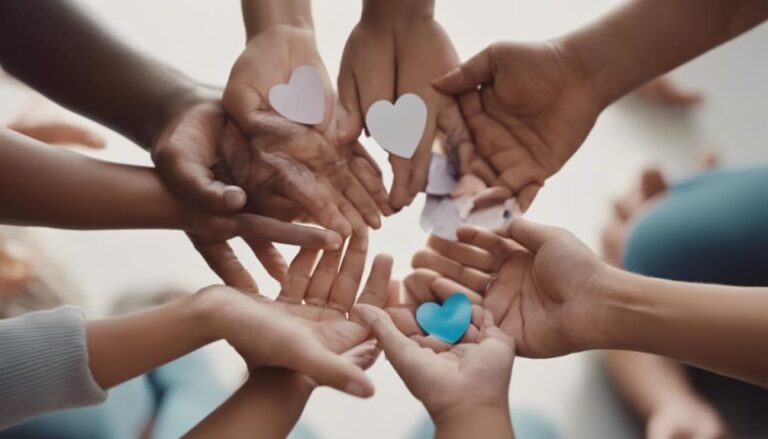If you’re a domestic violence survivor, there’s support like legal services for restraining orders and counseling for emotional healing. Emergency shelters provide safe housing, while financial programs help with independence. Safety planning resources aid in protecting yourself, and family services extend to your loved ones. Support groups offer community and peer counseling for solidarity. Advocacy guarantees your voice is heard in legal matters. Remember, you’re not alone in this journey towards healing and empowerment.
Key Takeaways
- Legal support offers free assistance, restraining orders, and guidance in legal matters.
- Counseling services provide safe spaces for survivors to process trauma and rebuild self-esteem.
- Emergency shelters offer safe refuge, temporary housing, and essential services during crises.
- Financial empowerment programs offer tools for financial well-being and job training for survivors.
- Safety planning resources help survivors strategize for protection and empower them to take control of their safety.
Legal Aid for Domestic Violence Survivors
If you’re a survivor of domestic violence, seeking legal aid can provide important support and guidance in understanding the legal complexities surrounding your situation.
Legal services tailored for domestic violence survivors offer free assistance and representation in critical matters such as obtaining restraining orders and guiding through custody battles. These organizations are dedicated to empowering survivors by advocating for their legal rights and offering support throughout the legal process.
Accessing legal aid services can be instrumental in helping survivors secure protection orders, initiate divorce proceedings, and establish child custody arrangements that prioritize safety and well-being. By leveraging the expertise of legal aid professionals, survivors can break free from abusive situations and take essential steps towards a more secure future.
These services not only provide legal assistance but also offer a sense of empowerment and reassurance to survivors as they navigate the challenging terrain of the legal system.
Counseling and Therapy Services
Counseling and therapy services play an essential role in providing emotional support and healing opportunities for survivors of domestic violence. Trained therapists offer a safe space for domestic violence survivors to process their experiences and develop coping strategies.
Through therapy, survivors can address feelings of guilt, shame, and fear, and work towards rebuilding their self-esteem and confidence. These services are often available through domestic violence shelters, community centers, and mental health clinics, providing survivors with access to individual, group, or family therapy sessions tailored to address the specific impact of abuse on their mental health and relationships.
Emergency Shelter and Housing Assistance
If you’re in immediate danger from domestic violence, emergency shelters offer a safe refuge and protection. These shelters provide temporary housing and essential services to help you during crisis situations.
Additionally, housing assistance programs can support you in finding stable and secure housing options for the long term.
Shelter Services Overview
During times of crisis, emergency shelters provide immediate housing for domestic violence survivors seeking safety and support. These shelters offer a secure environment where survivors can find refuge from abusive situations.
In addition to a safe place to stay, emergency shelters also provide essential resources such as counseling, safety planning, and legal advocacy. Organizations like CFPA are dedicated to offering temporary housing solutions to those in need. The goal of emergency shelters is to guarantee that survivors have a supportive space where they can begin to heal and rebuild their lives.
It’s essential for survivors to know that they aren’t alone and that there are services available to help them through this challenging time. By accessing emergency shelter support, survivors can take the first step towards breaking free from abuse and starting a new chapter in their lives.
The caring staff at these shelters are there to provide guidance, support, and a listening ear as survivors navigate their journey to safety and independence.
Housing Assistance Programs
When seeking support for domestic violence survivors, exploring Housing Assistance Programs can provide essential resources for finding safe and stable housing options.
Emergency shelter programs offer immediate safe housing for those in crisis situations, while housing assistance programs go further by supporting survivors in securing long-term housing solutions. These programs encompass transitional housing, rental assistance, and help in accessing affordable housing options.
By utilizing housing assistance programs, survivors can rebuild their lives and establish independence away from their abusers. The availability of such resources plays a pivotal role in aiding survivors to escape abusive environments and begin afresh.
Whether it’s providing temporary shelter or aiding in finding permanent housing, these programs are instrumental in helping survivors shift to a life free from violence. Embracing housing assistance programs can be a crucial step towards creating a secure and supportive environment for domestic violence survivors to thrive.
Financial Empowerment Programs
Financial empowerment programs can be an essential resource for domestic violence survivors like yourself. They offer tools and knowledge to take charge of your financial well-being. These programs provide education on budgeting, saving, and developing independence to help you build a stable financial future.
Financial Literacy Education
Empower yourself through financial literacy education programs designed to help you take control of your financial future as a survivor of domestic violence. These programs offer essential knowledge on budgeting, saving, and investing, equipping you with the tools needed for financial stability.
By participating in financial literacy programs, you can learn about credit management, debt reduction, and how to rebuild your financial independence. Such initiatives are pivotal in aiding survivors to break free from the cycle of financial abuse, enabling them to regain autonomy over their lives.
Financial empowerment programs not only educate survivors but also empower them to make informed decisions and plan for a secure future. Through increasing your financial literacy, you can pave the way towards a more stable and self-sufficient life post-domestic violence.
Economic Empowerment Resources
As you navigate your path towards financial independence, exploring economic empowerment resources can provide you with the tools and support needed to rebuild and secure your financial future as a survivor of domestic violence.
Financial empowerment programs offer a range of services such as financial education, job training, and assistance in creating sustainable financial plans tailored to your needs.
These programs are designed to help you regain financial independence and stability after leaving an abusive relationship.
Safety Planning Resources
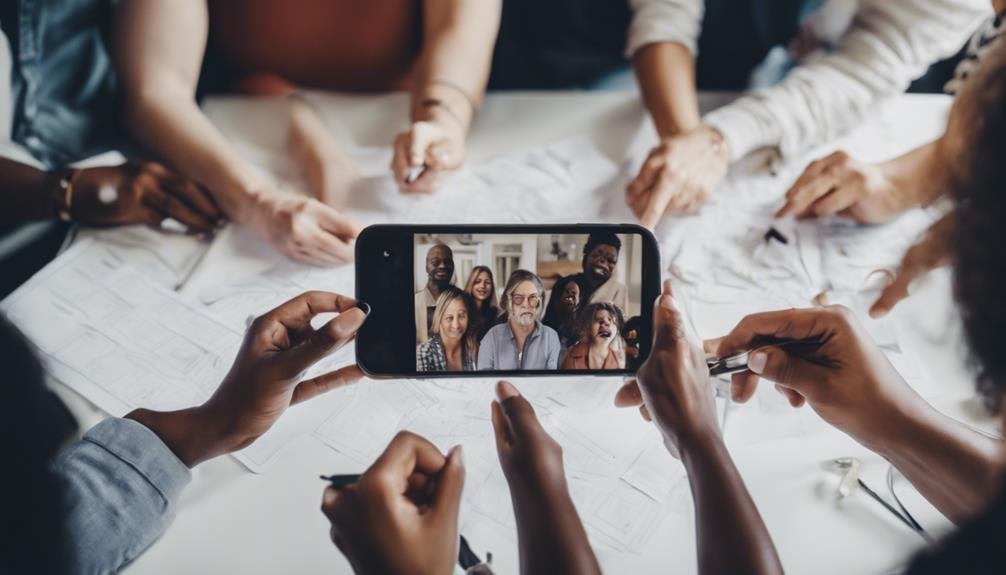
When preparing to leave an abusive situation, it’s essential to have access to safety planning resources that can help you strategize and stay safe. Safety planning resources are pivotal tools that assist survivors in creating strategies to protect themselves from further harm.
These resources often involve developing escape plans, securing important documents such as identification and financial records, and identifying safe shelter options where you can seek refuge. Leaving an abusive relationship can be a dangerous process, and having a safety plan in place is crucial for your protection.
Organizations like the National Domestic Violence Hotline offer valuable safety planning assistance to survivors. By utilizing these resources, you can empower yourself to take control of your safety and well-being in abusive situations.
Medical and Healthcare Support
You deserve compassionate medical and healthcare support as a domestic violence survivor. Access to healthcare services can help you address physical injuries, trauma, and mental health conditions.
Counseling, therapy, and trauma-informed care are essential tools to support your recovery and healing journey.
Access to Healthcare
Access to healthcare services is essential for domestic violence survivors to receive thorough medical and emotional support. Survivors of domestic violence may require immediate medical attention for physical injuries resulting from abuse. Seeking healthcare support is important not only for treating these injuries but also for addressing the long-term health consequences that may arise.
Health care professionals can provide survivors with counseling, therapy, and referrals to specialists, ensuring they receive holistic care tailored to their needs. Additionally, accessing healthcare services can aid survivors in documenting injuries for legal purposes, such as obtaining restraining orders for protection.
Trauma-Informed Care
Understanding the impact of trauma on survivors’ health, healthcare professionals trained in trauma-informed care provide essential support tailored to the unique needs of domestic violence survivors. Help is available through specialized services that recognize the mental and physical effects of abuse.
These professionals offer sensitive and supportive care, acknowledging the long-lasting implications on survivors’ well-being. By creating a safe and empowering environment, trauma-informed care focuses on addressing both the physical injuries and the mental health concerns of survivors. This approach guarantees that survivors receive the specialized care and understanding necessary for their healing journey.
Medical support for domestic violence survivors encompasses not only treating physical wounds but also facilitating access to resources that promote safety and overall well-being. By receiving trauma-informed care, survivors can find the help they need to navigate their healthcare needs while feeling supported and empowered in their recovery process.
Counseling and Therapy
To further support victims of domestic violence in their healing journey, counseling and therapy services play a vital role in addressing the emotional and mental trauma they’ve endured.
Survivors can access professional therapists and counselors who specialize in trauma to help them navigate the complex emotions and challenges that arise from domestic abuse. These therapy sessions provide a safe and supportive environment for survivors to process their experiences, develop coping mechanisms, and work towards healing and recovery.
Medical and healthcare support are also available to assist victims of domestic violence in addressing physical injuries, mental health issues, and other health-related consequences of abuse. Healthcare professionals can offer medical assistance, referrals to specialists, and access to resources that cater to the specific needs that may arise from instances of domestic violence.
Child and Family Services
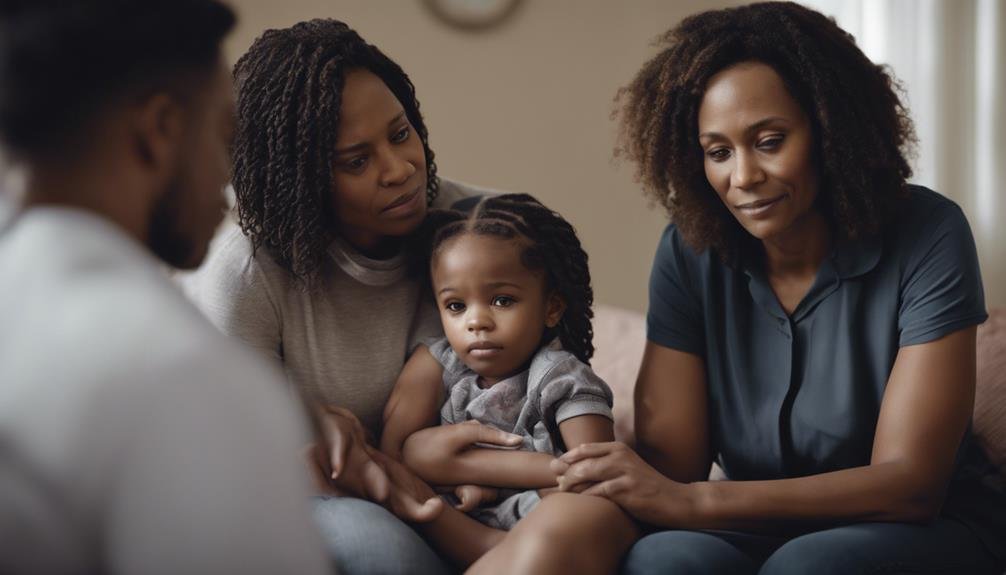
Child and Family Services stands ready to provide free and confidential support services for domestic violence survivors. They offer a range of resources aimed at empowering individuals and families affected by abuse. If you or someone you know is experiencing domestic violence, you can reach out to the National Domestic Violence hotline for immediate assistance and guidance, available 24/7.
Child and Family Services offers a safe haven through shelters, counseling, therapy, and safety planning to guarantee your well-being. Additionally, they provide essential resources for housing, basic needs, legal assistance, and financial independence to help you rebuild your life after abuse. All victim services at Child and Family Services are free and confidential, designed to empower survivors on their journey towards healing and independence.
Support Groups and Peer Counseling
If you’re a domestic violence survivor seeking a supportive community and empathetic guidance, consider joining support groups and engaging in peer counseling sessions for valuable insights and empowerment.
Support groups offer a safe and understanding space where you can share your experiences and receive emotional support from peers who’ve walked a similar path. Peer counseling connects you with individuals who can provide empathy and understanding, offering valuable coping strategies and insights to help you on your healing journey.
These resources not only reduce feelings of isolation but also provide a network of validation and encouragement. By participating in support groups and peer counseling, you can gain a sense of community and empowerment, knowing that you aren’t alone in your experiences of domestic violence.
Take the step towards joining these groups to find the support and understanding you deserve.
Advocacy and Legal Representation
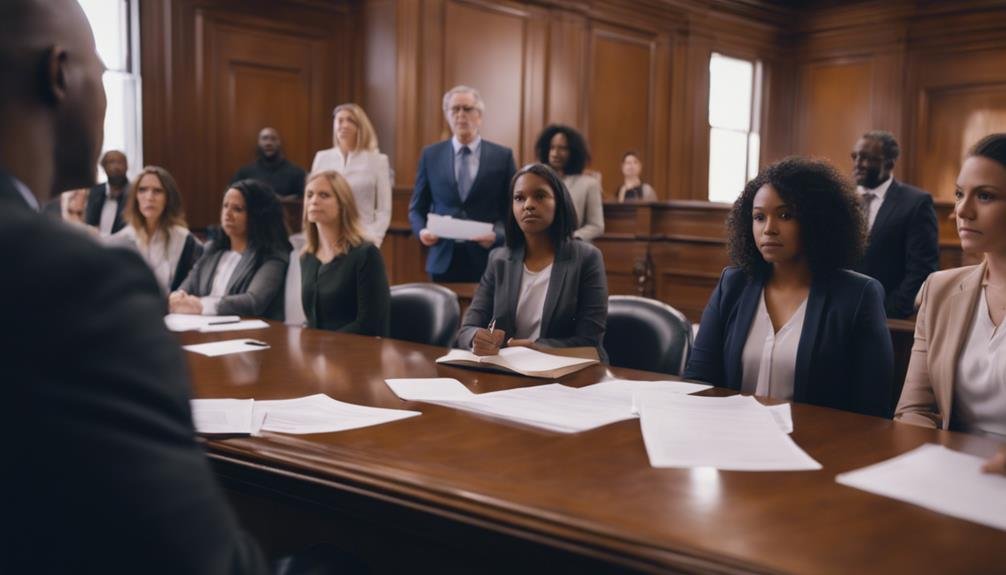
Consider reaching out to advocacy services and legal representation if you’re a domestic violence survivor in need of support and guidance through legal processes. Advocacy services offer confidential help and can provide important assistance in understanding your rights and navigating complex legal systems. Advocates work tirelessly to guarantee that your voice is heard and your needs are met within the legal system. They can assist you in filing protective orders, guiding you through court proceedings, and seeking compensation for any damages incurred.
Legal representation plays a significant role in empowering survivors to seek safety and justice. By enlisting the help of legal professionals, you can gain a deeper understanding of the legal options available to you and receive the support needed to pursue justice effectively.
Technology Safety and Privacy Measures
Utilize technology safety measures to safeguard against cyberstalking and monitoring by abusers, ensuring your privacy and security.
Take control of your online presence by adjusting privacy settings on social media platforms and devices to limit what others can see.
Be cautious of location-sharing features on smartphones, as they can potentially be used by abusers to track your movements.
Use secure messaging apps and strong, unique passwords to protect your communication and personal information from unauthorized access.
Remember that seeking guidance from domestic violence organizations can provide you with additional tech safety strategies tailored to your situation, offering an extra layer of protection.
By staying informed and proactive about technology safety measures, you can empower yourself to navigate the digital world more securely while maintaining confidentiality and peace of mind.
Your safety and privacy are paramount, and taking these steps can help you reclaim a sense of control over your online presence.
Frequently Asked Questions
What Are the Coping Mechanisms of Survivors?
You cope with the trauma of domestic violence through self-care practices like exercise, therapy, and creative outlets. Seeking support from friends, professional counseling, or connecting with similar survivors through support groups and hotlines can help you heal and thrive.
What Are Coping Mechanisms for Victims?
When coping with domestic violence, remember: support networks are essential. Seek therapy, practice self-care, join support groups, and create a safety plan. Utilize resources like shelters and legal aid. You deserve help and healing.
Conclusion
You’re not alone in this journey. Help is available in many forms, from legal aid to counseling services to emergency shelters. You deserve to feel safe and supported, and there are resources out there to help you every step of the way.
Remember, you have the strength to overcome this challenge and create a brighter future for yourself. Stay strong and reach out for the support you need. You’re worth it.

